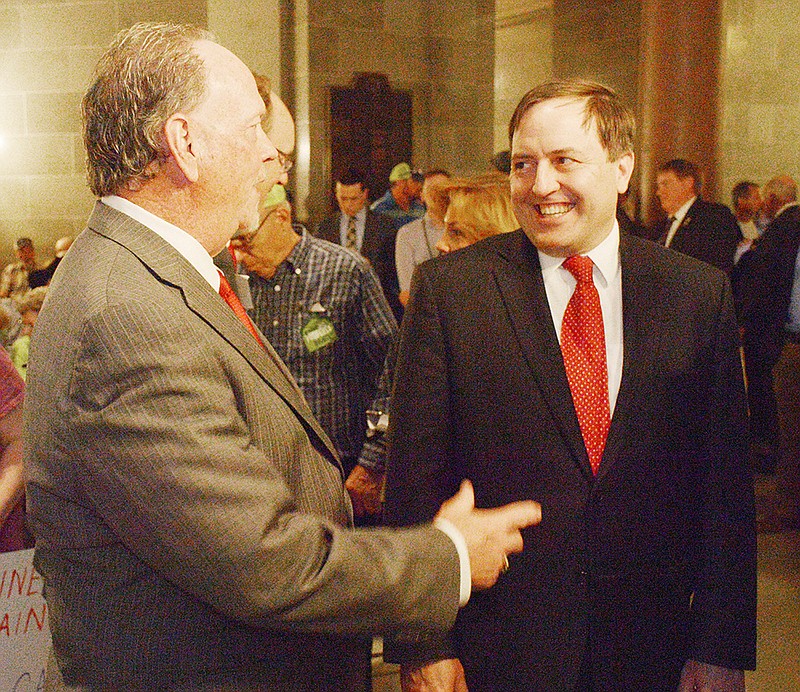A rally that attracted more than 200 people from around the state Tuesday afternoon to the Capitol Rotunda focused mainly on property rights and the power of eminent domain - even though its immediate target was the "Grain Belt Express" transmission line the Public Service Commission recently approved to be built across eight northern Missouri counties.
Missouri Farm Bureau President Blake Hurst, a northwest Missouri soybean farmer, acknowledged state law already allows the Transportation Department to acquire land for road-building purposes - as long as it pays fair value for that land.
And the law allows utilities - like Ameren Missouri or the electric cooperatives - the same power to take over land for construction of power lines, which is the same authority the Grain Belt Express sought from the PSC.
"It's pretty clear that 'Clean Line' is not a utility," he told the News Tribune. "They're a business that takes power from west of Missouri and moves it to east of Missouri.
"Everybody can get service from a utility, (which) has equal access, open access, to everybody."
However, Hurst said, most of the people along the Grain Belt line won't be able to use the wind-power generated electricity being carried across their land.
Gary Marshall, Missouri Corn Growers CEO and chairman of Missouri Farmers Care, began the rally by noting the proposed law seeking to overturn the PSC's approval of the Grain Belt Express "is a straight-forward measure to uphold private property rights in Missouri (and protect) landowners from eminent domain for private gain."
Lt. Gov. Mike Kehoe served as the master of ceremonies, introducing various lawmakers and state officials during the rally.
"It's hard enough when eminent domain stares you in the face from an entity that has the constitutional right to use it," Kehoe said. "Agriculture is our state's number one industry.
"But, in order to continue to be the number one industry, we need to make sure we're protecting our family farms and we're protecting the ability for me, as a first-generation farmer, to ensure there is a second-generation farmer."
Secretary of State Jay Ashcroft said personal property rights are "a basis for our government (and) freedom, liberty and opportunity."
He supported landowners' desire "to make your own decisions about how to live your life, and to tell the government to leave you the heck alone."
Kehoe noted most forecasters said the world's demand for food will double by 2050, "and Missouri needs to be a major player in that."
Senate Majority Leader Caleb Rowden, R-Columbia, said a statistic he saw recently said "the average farmer feeds 155 people."
He agreed with Ashcroft that government should stay out of people's way - "except when we need to step in and protect you from these sorts of things that are happening."
State Treasurer Scott Fitzpatrick said the principle of private property rights "dates back to prior to the founding of our country," noting Thomas Jefferson's language in the Declaration of Independence was influenced by philosopher John Locke a century earlier, who had described "the trinity of life, liberty and property."
Fitzpatrick added: "Property rights are sacred in our country, and should be defended at every turn."
Senate President Pro Tem Dave Schatz, R-Sullivan, told the crowd "no one knows your land better than you."
And Rep. Jim Hansen, R-Frankford, who sponsored the bill aimed at blocking the Grain Belt Express power line, told the rally: "This is a critical issue for our state. It's a critical issue to the eight counties that we're defending here.
"But I don't want you to just focus on those eight counties. We're defending the whole state of Missouri and (its) 114 counties."
He added: "Our goal is to stop this madness, so you can farm and don't have to farm around something that's interfering with your operation and taking away your personal property rights."

